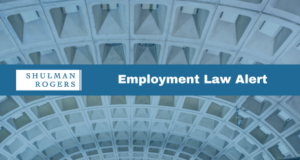
In a major development for employers, on June 20, 2023, the New York legislature passed a Bill (A01278B) banning all non-compete agreements. If signed by Governor Kathy Hochul, the law would take effect 30 days after signature, though likely will only be applicable to non-competes entered into or modified 30 days after the effective date. The Bill follows the trend of four other state’s codifying non-compete bans into law, as well as the heightened scrutiny and increased restrictions of non-competes by many states, including in Maryland and D.C. Here is what you need to know:
Unlike most prior state laws, Section 191-d(2) is a total ban on non-compete agreements. It prohibits an employer or its agent, or the officer or agent of any corporation, partnership, limited liability company or other entity, from seeking, requiring, demanding or accepting a non-compete agreement from any covered individual.
The Bill defines a “non-compete agreement” as “any agreement, or clause contained in any agreement, between an employer and a covered individual that prohibits or restricts such covered individual from obtaining employment, after the conclusion of employment with the employer included as a party to the agreement.” The Bill broadly defines a “covered individual” as “any other person who, whether or not employed under a contract of employment, performs work or services for another person on such terms and conditions that they are, in relation to that other person, in a position of economic dependence on, and under an obligation to perform duties for, that other person.” So, regardless of a worker’s salary or job function, non-competes are prohibited.
Similar to other state laws, Section 191-d(4) creates a private cause of action, allowing any affected covered individual to directly bring a civil action against any person(s) who violates the ban. Specifically, a covered individual will have up to two years from the later of: (i) when the prohibited non-compete agreement was signed; (ii) when the covered individual learns of the prohibited non-compete agreement; (iii) when the employment or contractual relationship is terminated; or (iv) when the person(s)/(employer) takes any step to enforce the non-compete agreement.
A covered individual may seek lost compensation, damages and reasonable attorney’s fees and costs, in addition to voiding the prohibited non-compete. The Bill further provides that every covered individual affected is entitled to mandatory liquidated damages in an amount not to exceed $10,000.
The Bill does not: (i) prohibit an employer/person from entering into an agreement for a “fixed term of service; (ii) prohibit an employer/contracting person from restricting the solicitation of their customers/clients that the covered individual learned about during employment, or contractual relationship provided that the agreement does not otherwise restrict competition in violation of Section 191-d; and (iii) apply to prohibitions or restrictions on the disclosure of trade secrets or confidential and proprietary information. The Bill does not specifically mention agreements banning solicitation of other employees, which presumably would remain permissible. Quite notably, and unlike other states (including but not limited to California), the Bill does not contain any express exception for non-competes entered into in connection with the sale of a business.
Key Takeaways
If enacted, this will be a dramatic change for New York employers who have historically been able to enter into reasonable non-compete agreements with their workers. In light of this Bill, we encourage our clients either located in New York or with an employee presence in New York, to consult with your legal counsel soon – as all restrictive covenant agreements or similar provisions included within other agreements offered to individuals may soon need to comply with these significant changes if this Bill is signed into law. Moreover, employers and contractors will need to consider whether it is in their best interests to maintain or continue to enforce any pre-existing non-compete agreements “grandfathered” or exempted from the law.
Most importantly, this should compel serious discussions with your legal counsel as to how best “protect what you value” – including proprietary information, customers/clients and key employees – going forward. To prepare for that conversation, you might want to review the Asset Audit checklist, available through this link, as a reasonable first (self-diagnostic) step.
Stay up to date with all the latest news and events.